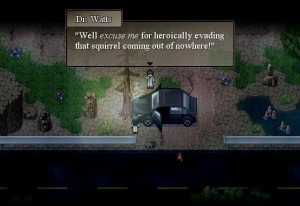
“Well, excuse me for heroically evading that squirrel coming out of nowhere!” The game uses the humor of Watts to offset the gravity of the story.
I often find myself in a position where I must defend the artistic value of games. While it is true that not all games have much value as works of art, every now and again a game comes along that truly shines in this respect. It has that special something that makes it wonderful, memorable, and touching. To the Moon is one such game.
Mission Plans
To the Moon is an adventure game where you take control of Drs. Eva Rosalene and Neil Watts. These doctors work at the wish-fulfillment company Sigmund Corp. and are paid to dive into their patients’ memories in an effort to give them new memories of a single wish. In the case of the game, the patient, Johnny Wyles, lies dying in his bed, and he wants to go to the moon (who knew?). It is up to you to take him there.
Pre-Flight Checklist
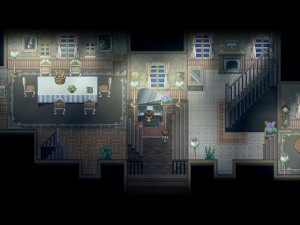
One of Johnny’s most recent memories is of him sitting at the piano in anguish, trying to compose a song.
Rosalene and Watts begin at Wyles’ most recent memory and slowly work their way back to his childhood. The doctors must explore his memories in order to learn more about Johnny’s life. This knowledge unlocks momentos: places, people, events, or artifacts that link one memory to another. After they have found enough momentos in a specific memory, Rosalene and Watts can then dive a little deeper into Johnny’s past.
This mechanism allows for a lot of fun guessing about directions that the plot is going to go. It is not unlike the way that the movie Momento is structured and it allows for the same kind of “What is going on here?” moments that made the movie so fun. With each scene, a little more of the plot is revealed and the drama deepens.
We have ignition
While there are many wonderful qualities about the game, one thing that I think that it is clearly weak on is gameplay itself. There are very few choices that you make as a player that have any meaning; for the most part you watch a scene and then explore the world, clicking on objects in order to inspect them to see if they are momentos.
The only other game aspect is the momento puzzles. After you have unlocked a handful of momentos for a particular scene, Rosalene and Watts will attempt to link deeper into Wyles’ memories by breaking into a momento. This takes the form of a simple puzzle game. The momento is partially displayed and you must flip over either columns, rows, or diagonals to complete the image. It usually only takes a few clicks in order to complete these puzzles, but they do break up the telling of the story quite nicely.

The game lacks a combat system, but Dr. Watts still makes an attempt to fight a vicious squirrel to lighten the mood at one point.
One thing that I think would have made the gameplay more compelling was if it directly affected the plot in some way. For instance, what if there are more momentos in each memory than you need to advance the story, and depending on which ones you discover the game evolves slightly differently? Or perhaps failing to break into a momento in a certain amount of time causes the procedure to end differently.
I feel like there is a lot of potential here for creativity and to give the game a sense of urgency… though I can see where the game designers wanted players to not be in a hurry and not be worried about failure. The game is more about experiencing the story than anything else.
Exiting upper atmosphere
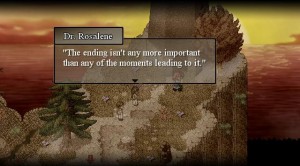
"The ending isn't any more important than the moments leading up to it." Dr. Rosalene puts her two cents in on the Mass Effect 3 ending controversy.
The story itself is a story with well-placed twists and turns. Rosalene and Watts quickly realize the love and loss that Johnny Wyles has experienced and it is heart-wrenching to watch the story unfold.
One thing that I really appreciated about the game was that although the story is somewhat complex, with a fair number of characters and taking place over the course of many years and the graphics are minimal, I didn’t struggle with trying to figure out what the point of the scene I was watching was. The game designer’s intent for any scene was very clear and very powerful.
Matching the plot’s excellence is the wonderful musical score. It is an utter delight, full of whimsy (my favorite thing), moving from dark and sorrowful notes to upbeat, whimsical tracks. I actually bought the soundtrack to the game before I played through the game, and I wasn’t disappointed with either.
And I have to say, that the game did make me tear up a couple of times, thinking about the meaningless and meaningfulness of life.
To the Moon… To the Stars
Even though I don’t find the game aspects of To the Moon particularly compelling, the story is beautiful and touching, the music is superb, and the characters are memorable. With a low price of just a few dollars, what’s not to love? It’s relatively short, at around 3-4 hours.
The puzzles and the exploration might be the game, but they are not the sum of the experience. And it is the experience that makes To the Moon so compelling, and I recommend it heartily.
I can’t wait for sequel.
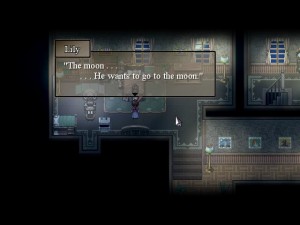
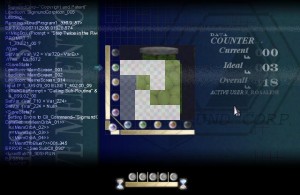
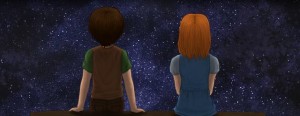
Comments